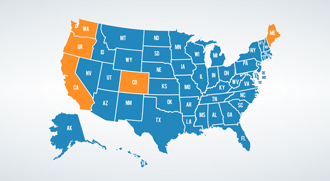Regulatory Activity Accelerates in Four EPR States
More States Expected to Adopt EPR Laws

The year 2023 is an incredibly active one for extended producer responsibility (EPR) laws, which are now being implemented in the four states that passed EPR laws for packaging—so far.
Over the past two years, the initial EPR initiatives passed into law are as follows:
- Maine’s Legislative Document 1541 in 2021
- Oregon’s Senate Bill (SB) 582 in 2022
- Colorado’s House Bill 22-1355
- California’s SB 54
They are all hard at work with the rulemaking process. Each state’s EPR program is structured differently with various requirements. As a result, the laws can create compliance challenges for some. Therefore, the stakeholder outreach discussions among the states, industry members, and the public are critical to ensure all parties’ interests are represented, heard, and understood. Here is a quick snapshot of where the states are in the implementation process.
Maine
Maine’s Department of Environmental Protection has 12 scheduled rulemaking stakeholder outreach meet-ings through December 2023, with the anticipated adoption of routine/technical rules and provisional adoption of major substantive rules in the summer of 2024. Stakeholders are currently discussing “municipal reimbursements” before the next rule development topic of “audits” and “program goals.”
Oregon
Oregon’s Rulemaking Advisory Committee—consisting of appointed members who reflect entities directly and indirectly affected by proposed changes to the rules—is scheduled to conduct its fifth rulemaking meeting regard-ing “PRO (producer responsibility organization) Fees and Plan Requirements, Local Government Compensation, and Material Lists.” A draft of these rules will be considered by the Environmental Quality Commission in September 2023. The committee is scheduled to review the next set of rules from July through December 2023; those discussions will focus on processor fees, certification, generator contamination reduction programs, and life-cycle assessment standards. Oregon’s Recycling System Advisory Council also meets quarterly to review key elements in the recycling system and provide recommendations.
The enacted EPR states are heads down in their rulemaking processes, but that doesn’t mean EPR legislation is stopping in other states.
Colorado
Colorado’s Producer Responsibility Advisory Board consists of local governments, recycling companies, nonprofits, and other key stakeholders. It conducted two board meetings thus far this year discussing the program and rulemaking process and will hold monthly board meetings going forward. The largest deadline this year is June 1, when PRO needs to be formed. To be consid-ered, all interested parties must submit their letter of intent and their PRO application.
California
CalRecycle held an informational session in January that provided an overview of the rulemaking process and its timeline. The informal rulemaking process will start late this year. The formal rulemaking process will begin in 2024.
The enacted EPR states are heads down in their rulemaking processes, but that does not mean EPR legisla-tion is stopping in other states. Some states are reintroduc-ing past bills; others states will introduce EPR proposals for the first time. These actions guarantee EPR will continue producing momentum for the rest of 2023.
Lauren Aguilar is a government affairs associate at the firm Serlin Haley, a lobbyist for FPA based in Washington, D.C. Andy Hackman also is a lobbyist with Serlin Haley.


